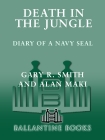Death in the Jungle Gary Smith (mobi reader txt) 📖

- Author: Gary Smith
Book online «Death in the Jungle Gary Smith (mobi reader txt) 📖». Author Gary Smith
Then there was the time at Stead Air Force Base Survival School when I had spent forty-eight hours in a simulated POW camp. After many hours of mental torture, I literally had been pushed, squeezed, and compacted into a wooden box barely big enough for a rabbit. So tight was the fit that it had taken two men to pressure the door of the box shut. When I had heard the click of the lock, I had almost lost it. There I was, in a compressed fetal position, so crushed that my lungs couldn’t expand—I couldn’t breathe. I had mentally scolded and ordered myself to calm down, then started inhaling and exhaling tiny, rapid breaths of air. This had kept me alive until four hours later when the door was opened and I was pried back into civilization. With incidents like these in my past, sitting in two feet of water for a few hours was as easy as ogling the curves of Raquel Welch.
Two hours later, I felt something nibbling on my left wrist. I hastily brushed the creature away, but another swam through my arms. Then another. I was surrounded by several tiny fish. I chased them away with my hands, then they were back in a matter of seconds. I decided not to resist, and they continued to play and nibble.
The fish stuck around for a long while, and suddenly they were gone. Maybe the smell of Bucklew down the line had done the trick. Or perhaps it was the fact that I had just urinated through my clothing. At any rate, my little friends departed. I was left to my mission, which was to ambush the enemy.
Since I was on the right flank of our point ambush, my responsibility was to watch for any sampans approaching from the right, which in this case was south. In the event of a sighting, I was to tug three times on the parachute suspension line that I’d strung between me and Bucklew, who was several meters to my left with the line tied to his right wrist. Bucklew was to then pull on another line linking him to Lieutenant Meston, who would likewise pass the message. We were to hold our fire until the enemy skiff reached the middle of the kill zone, which was right in front of our middle man. Once the center of the kill zone was penetrated, the platoon commander would initiate the ambush. That was when all seven of us would open fire, and when some gooks would wish they were dreaming. It was my job to put them to sleep.
More hours slid by and the sun went down. The fish hadn’t returned. Just a few mosquitos annoyed me. No VC had yet made an appearance, but we were not really expecting them until late in the night.
I gazed at Bucklew one last time before it was too dark to see him.
I tugged once on the suspension line, which asked, “Are you okay?” I thought he was looking at me, then he smiled, and I knew he was. I smiled back.
Darkness settled on us shortly thereafter and Bucklew disappeared. I stared at the moonlit water in front of me and reflected a while about why I was there. I blamed it on Life magazine (or was it The Saturday Evening Post?), which had printed a cover picture of a soldier looking up to the heavens and a hand reaching down to him. I had been in grade school in Abilene, Texas, at the time, and I had tacked that picture up in my bedroom. It had made me think: Am I predestined to be a career military man? From that time forward, I had been obsessed with playing war.
The man who had lived next door to my family had served in World War II, and he had fueled my obsession by giving me some German and Jap gear, including a gas mask, web gear, and dummy grenades. When I was fifteen, my family had moved to Wichita Falls, where I became a frequent visitor of a country club. I had dressed in military utility greens and boots, wielding my pellet rifle, and I had carried out secret operations all over the club’s golf course, which had been “enemy controlled territory.” Occasionally I had shot a grey squirrel for my taxidermy projects; however, the country club’s security personnel had thought dimly of my actions. Whenever they had spotted me with my rifle, they had assaulted my position in their golf carts.
Escape had not always been easy, especially when I had had my goofy Brittany Spaniel with me. Sometimes I had done what Hawkeye in The Last of the Mohicans did—I had crawled (dragging my dog) to the creek, slid into its dirty water, and maintained a low profile in the weeds that grew in and around it. Never mind the water moccasins—the water had become my friend. Fortunately, I had never been caught. After three years of numerous close calls, I had retired to the campus of Midwestern University, where I had figured out ways of hiding from my professors without being missed.
Now, here I was, twenty-five years old and still





Comments (0)